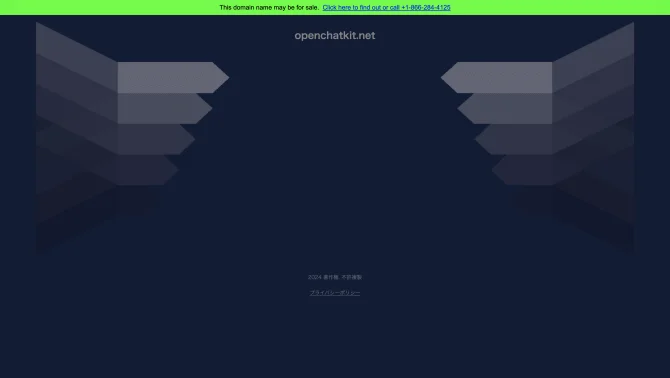Introduction
OpenChatKit is a groundbreaking open-source project that simplifies the process of developing AI-powered chatbots for a variety of applications. It offers a comprehensive set of tools and a powerful base for both specialized and general-purpose chatbots. With OpenChatKit, developers can leverage its advanced natural language processing capabilities, machine learning algorithms, and customizable models to create chatbots that understand and respond to user queries effectively. The modular design allows for easy extension and customization, fitting seamlessly into different platforms and use cases.
background
Developed as an alternative to proprietary chatbot solutions, OpenChatKit is the result of collaboration with LAION and Ontocord, ensuring a diverse and rich training dataset. Released under the Apache-2.0 license, it encourages community contributions and ongoing improvement, making it a dynamic and evolving toolkit that is community-driven and transparent.
Features of OpenChatKit
Open Source and Freedom
OpenChatKit is released under the Apache-2.0 license, providing full access to source code, model weights, and training datasets, fostering innovation and flexibility.
Powerful Functionality
It includes a base bot and components for creating specialized chatbots, catering to various needs such as intelligent assistants, customer service, and Q&A systems.
Modular Design
The toolkit's modular architecture allows developers to add or remove functionality based on specific application requirements, ensuring adaptability.
Natural Language Processing
Integrates advanced NLP to enable smooth and natural interactions, including voice recognition and text conversion.
Machine Learning Algorithms
Offers a suite of machine learning algorithms for tasks such as sentiment analysis and intelligent recommendations.
Custom Model Training
Developers can train models based on business needs using OpenChatKit's custom model feature for precise understanding and recommendations.
Open API Interfaces
Provides extensive API interfaces for secondary development, allowing for the addition of advanced functionalities.
Cross-Platform Support
Supports multiple platforms including Web, mobile, and desktop, facilitating the creation of multi-channel chatbot applications.
How to use OpenChatKit?
To utilize OpenChatKit, start by downloading the source code from the official repository. Install the necessary dependencies like Python and TensorFlow. Configure the model with your dataset and parameters. Develop your chatbot using the provided APIs and components. Finally, deploy and rigorously test the chatbot on the intended platform.
FAQ about OpenChatKit
- How do I get started with OpenChatKit?
- Begin by visiting the official OpenChatKit website and downloading the latest version. Follow the provided documentation for installation and setup.
- What programming languages does OpenChatKit support?
- Primarily Python, but its APIs can be integrated with other languages as needed.
- Can I use OpenChatKit for commercial projects?
- Yes, OpenChatKit is released under the Apache-2.0 license, which allows for commercial use.
- How can I contribute to OpenChatKit?
- You can contribute by submitting pull requests, reporting issues, or adding to the training datasets.
- What kind of chatbot can I create with OpenChatKit?
- You can create a wide range of chatbots, from simple Q&A systems to complex customer service and personal assistant bots.
- Is there a community forum for OpenChatKit?
- Yes, the community forum is a great place for developers to ask questions, share ideas, and collaborate on improvements.
- How do I train a custom model with OpenChatKit?
- Use the custom model feature to train your bot with your specific dataset, fine-tuning it to understand and respond accurately to user queries.
- What are the system requirements for running OpenChatKit?
- Ensure you have Python and TensorFlow installed, and your system meets the requirements for running machine learning models.
Usage Scenarios of OpenChatKit
Educational Assistants
OpenChatKit can be used to create chatbots that assist students with learning, providing information and answering questions on various subjects.
Customer Service
In the customer service domain, chatbots can handle FAQs, provide product information, and assist with troubleshooting.
Healthcare Information
Chatbots can offer guidance on common health issues, provide information on treatments, and assist with appointment scheduling.
E-commerce Support
Retail chatbots can help customers with product recommendations, checkout processes, and post-purchase support.
Market Research
Chatbots can collect user feedback and conduct surveys to assist with market research and product development.
User Feedback
Users have reported that OpenChatKit is user-friendly and easy to integrate into existing projects, making it a popular choice for developers.
Developers appreciate the toolkit's flexibility and customization options, allowing them to tailor chatbots to their specific needs.
The community-driven nature of OpenChatKit has been praised for its responsiveness and the active involvement of its user base in improving the tool.
Feedback highlights the high performance and reliability of the chatbots developed with OpenChatKit, even under high load.
others
OpenChatKit's open-source nature positions it as a cost-effective solution for businesses and individuals looking to leverage AI without breaking the bank. Its community-driven approach ensures continuous updates and improvements, keeping the toolkit at the forefront of AI chatbot technology.
Useful Links
Below are the product-related links of OpenChatKit, I hope they are helpful to you.
